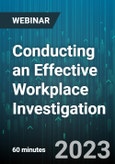Employers are legally mandated to investigate harassment, discrimination, retaliation, safety, and certain other types of complaints. And good investigators first create a plan that includes:
- What is the objective?
- Who will be interviewed?
- What will be investigated?
- What evidence needs to be collected?
A poorly conducted internal investigation can cost a company financially and damage its reputation, not to mention the reputation of the person tasked with overseeing such a probe. Some of the common mistakes made include:
- Failing to plan
- Delaying an investigation
- Not remaining objective
- Using aggressive interviewing tactics
- Not conducting a thorough investigation
- Failing to reach a conclusion with a written report
Employers must demonstrate fairness when conducting workplace investigations. and investigations should be thorough and well-documented before an employer takes any action. Additionally, effective workplace investigations need to be guided by the following principles:
- Neutrality-HR and other personnel involved in an investigation must be detached from an incident, remain objective, have no personal stake in the outcome, and give all employees involved the opportunity to provide their version of the incidents
- Thoroughness-To ensure that the proper decision is made investigators must be thorough in uncovering all the necessary information while asking detailed questions during interviews
- Timeliness-Once an investigation is triggered, investigators must act promptly to avoid further acts of wrongdoing with any disciplinary action administered in a timely manner to avoid legal issues.
Why you should Attend
An internal investigation is a formal inquiry to determine whether workplace policies or regulatory practices have been violated. Investigations can follow:- A complaint
- Allegation
- Suspicion of misconduct
- Fraud
- Harassment accusations
- Or many other reasons covered by federal, state, and/or local employment laws.
- What happened
- When it happened
- Who was responsible
- Who may have been harmed
- What actions may be necessary to prevent the alleged wrongdoing from reoccurring
The final investigative report should include:
- The incident investigated, with the dates
- The individuals involved
- Key factual findings
- Applicable employer policies
- Interviewees’ statements
- Conclusions
- Issues that couldn't be resolved
- Employer’s follow-up action
And if the organization terminates or disciplines an employee and that person files a lawsuit or complaint the investigation report will be critical in protecting the company in court. While every complaint is unique, having a well-defined, consistent process in place can ward off future lawsuits.
Areas Covered in the Session
- Recognizing the Situations Where an Internal Investigation May be Warranted
- Our Role When Conducting Investigations
- Information to Obtain to Determine the Best Approach to the Investigation
- Determining Who Should be Interviewed
- Utilizing an Introductory Interview Guide
- Following a Proven Interview Methodology
- Utilizing an Investigatory Interview Questionnaire
- Closing the Interviews
- Preparing an Investigatory Findings Report
Speaker
Pete Tosh is Founder of The Focus Group, a management consulting and training firm that assists organizations in sustaining profitable growth through four core disciplines:Implementing Strategic HR Initiatives: Executive Search, Conducting HR Department Audits, Enhancing Recruiting, Interviewing & Selection Processes, Installing Performance Management Programs, Conducting Training Needs Assessments, Installing HR Metrics, etc.
Maximizing Leadership Effectiveness: Facilitating Team Building Initiatives, Designing and Facilitating 360 Performance Assessments, Executive Coaching, Measuring and Enhancing Employee Engagement and Performance, etc.








